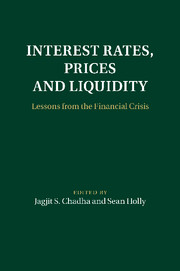
- Cited by 5
-
Cited byCrossref Citations
This Book has been cited by the following publications. This list is generated based on data provided by Crossref.
Breedon, Francis Chadha, Jagjit S. and Waters, A. 2012. The Financial Market Impact of UK Quantitative Easing. SSRN Electronic Journal,
DRIFFILL, JOHN 2013. FINANCIAL SHOCKS, UNEMPLOYMENT AND PUBLIC POLICY. The Manchester School, Vol. 81, Issue. S2, p. 1.
Ashworth, J. 2013. The New Palgrave Dictionary of Economics. p. 1.
Chadha, Jagjit S. and Kang, Young-Kwan 2016. Monetary Policy in India. p. 507.
Ashworth, J. 2018. The New Palgrave Dictionary of Economics. p. 11073.
- Publisher:
- Cambridge University Press
- Online publication date:
- November 2011
- Print publication year:
- 2011
- Online ISBN:
- 9781139044233
- Subjects:
- Economics, Economic Theory
- Series:
- Macroeconomic Policy Making


